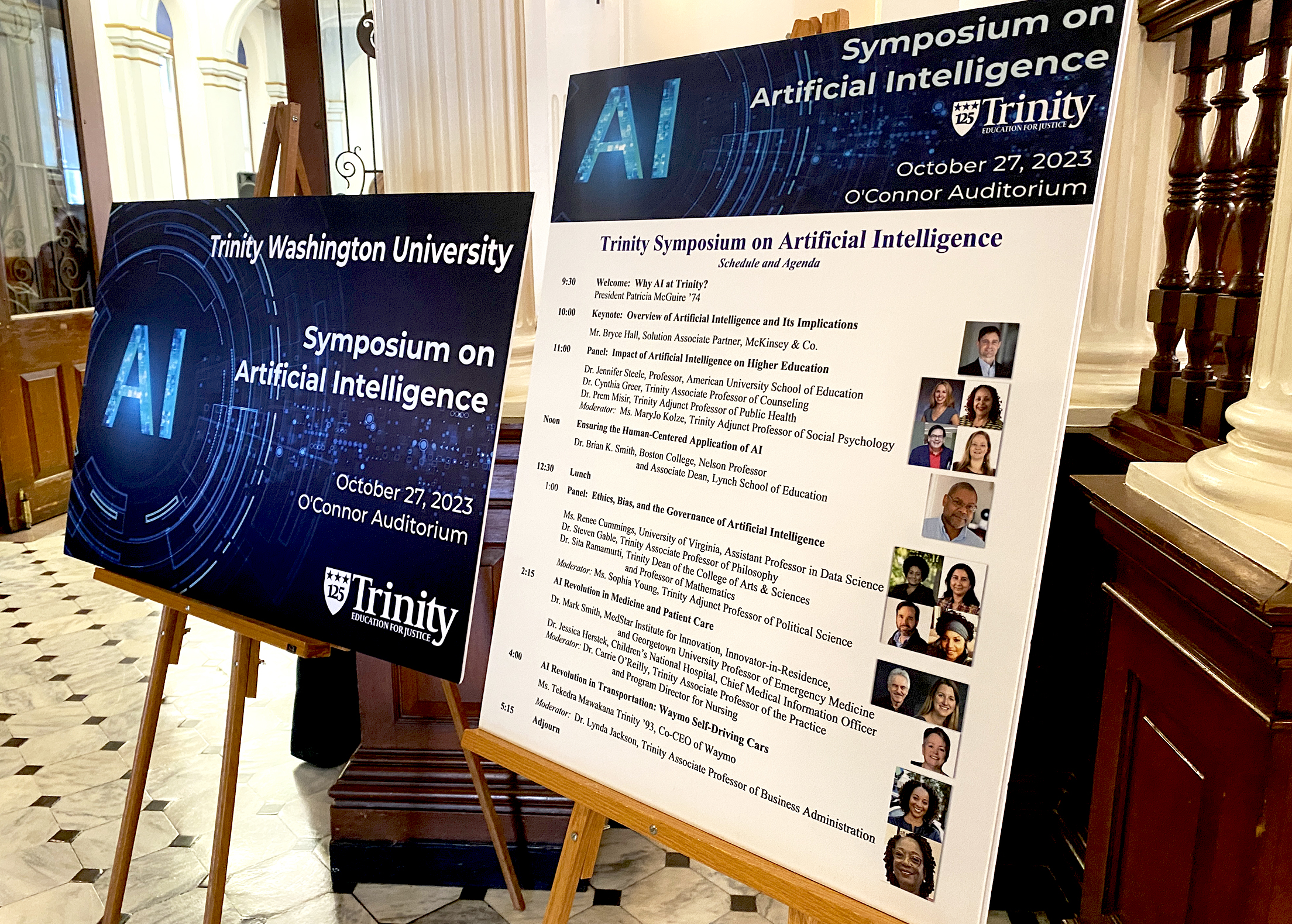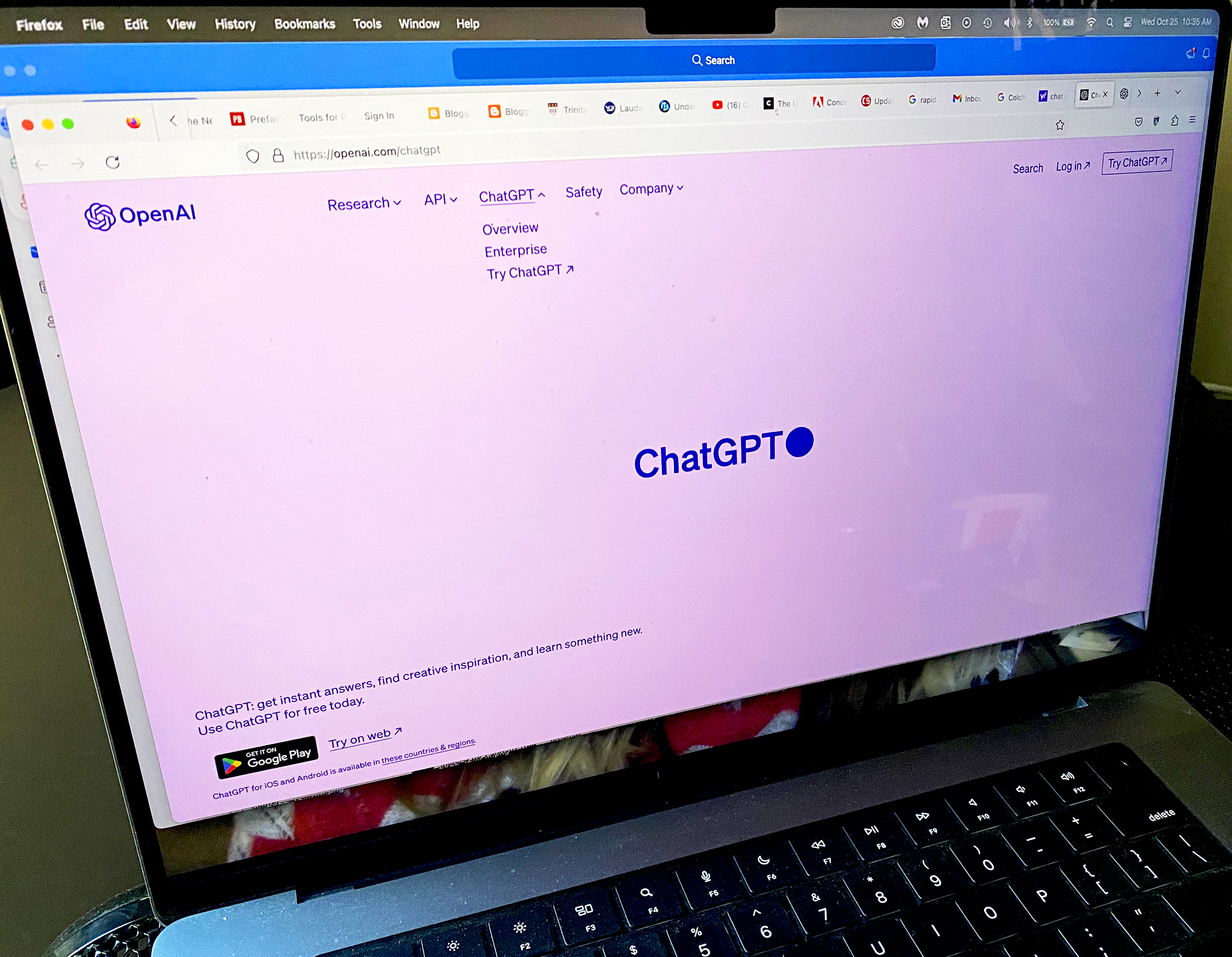
By Kayla Higgs
Trinity Times Correspondent
Artificial Intelligence impacts most Americans whether they are aware of it or not, except for those living completely off-grid, prompting Trinity Washington University to host an in-depth symposium about the topic on Oct. 27, 2023, to bring thorough comprehension to such a complex area of everyday reality.
Better known by its acronym A.I., the topic is being covered extensively all over the media.
Though A.I. has been around for a while, the release of the chatbot ChatGPT nearly a year ago created universal awareness and it has become a major topic in education.
The explosion of A.I. consciousness and concern made for a natural arena for Trinity to explore in its A.I. Symposium as the university continues to celebrate its 125th anniversary.
“The adoption of A.I. tools is rapidly changing work and the workforce, and we must prepare our students in all disciplines for how A.I. will affect their professional – as well as personal – lives going forward,” Trinity President Patricia McGuire said in an Oct. 23 email to university faculty and staff.
The symposium schedule features panels with students, Trinity staff, and faculty members, as well as professionals in the Artificial Intelligence space, to speak on multiple topics related to the technology.
Keynote speaker Bryce Hall – an associate partner at McKinsey & Co. and author of “The State of A.I. in 2023” – will open with an overview of what A.I. is, followed by panel discussions on the impact A.I. has on higher education; ensuring human-centered application of A.I.; ethics, bias, and the governance of A.I.; the A.I. revolution in medicine and patient care; and concluding with A.I. in transportation.
Panel moderator Sophia Young, an adjunct professor of political science at Trinity, told Trinity Times A.I. has been on her radar for a while as she also works with the Department of Homeland Security’s Cybersecurity sector and has an interest in technology.
“I wanted a seat at the table of A.I.” after the Biden Administration called on Big Tech to address how it would handle the safety and ethical concerns of the technology, Young said.
She and McGuire have related their concerns surrounding A.I. in higher education with the main issue being the use of ChatGPT in writing and research, while only 5% of survey participating students at Trinity admitted to using the application in Trinity’s October Community Survey.
Other apprehensions – such as unethical racial bias, the impact on elections, unethical surveillance, and the impact on the workforce – have only added to Young’s concerns about the unregulated A.I. movement.
McGuire is particularly concerned about gender bias and the impact A.I. has on relationships.
Higher education and politics aren’t the only sectors experiencing rising anxieties regarding Artificial Intelligence.
Just this year the Writers Guild of America and the Screen Actors Guild – American Federation of Television and Radio Artists (SAG-AFTRA) union went on strike with A.I. being an area of contention in their contract negotiations with Hollywood studios.
For the Writers Guild of America, a deal was struck with the Alliance of Motion Picture and Television Producers (AMPTP) outlining a policy on A.I., which essentially “doesn’t prevent writers or productions from making use of generative A.I. but prohibits using software to reduce or eliminate writers and their pay,” according to Vox News.
However, SAG-AFTRA has not reached a deal with the AMPTP. It is seeking contract language that would include “a comprehensive set of provisions to grant informed consent and fair compensation when a ‘digital replica’ is made or our performance is changed using A.I.,” the union’s website stated.
A.I. is currently unregulated by the federal government and professionals from private sectors and institutions are seeking to put their own policies on A.I. in place.
“At what point do higher education institutions begin to say ‘we already have a policy on plagiarism… so at what point do we create some type of language surrounding the use of A.I. when it comes to our papers,'” Young said referring to the use of ChatGPT in academia.

These are questions Trinity administration officials have been contemplating for a while and this fall a collective of professors and administrators drafted a university-wide policy on Artificial Intelligence. Provost Ocampo said she has received positive feedback on the newly drafted policy.
The new Trinity policy on Artificial Intelligence defines it as “machine or software systems that process information and create outputs that can mimic some aspects of human thinking.”
This means that A.I. includes household staples like Alexa, the Siri technology on iPhones, chatbots, as well as applications that can create deepfakes (a video of a person in which their face or body has been digitally altered so that they appear to be someone else, typically used maliciously or to spread false information.)
The policy, approved by the University Committee on Academic Policy, states that generally students can use A.I. to aid in the academic process but not to replace academic thinking.
Additionally, the policy lists how A.I. should be used in testing and written assignments.
In other words, ChatGPT is not banned and according to the October 2023 Community Survey results, no faculty wanted the A.I. chatbot to be completely prohibited from use anyway.
Artificial Intelligence may have warning signs all over it, but university officials have concluded that it isn’t all bad and in fact, most people use it every day.
Algorithms that tailor one’s social media feed to what they like to see, GPS on a phone, Alexa, and Siri are all forms of A.I.
The technology has already improved the way people interact with the world and more transformation is to come. McGuire lists a couple of positive aspects, such as innovations in transportation – citing Waymo (formally the “Google Self-Driving Car Project”) as an example – which is considered helpful for the environment.
A.I. is also transforming how consumers receive products and services, Young said, adding that Artificial Intelligence can make the industry sector more efficient and, despite concerns, chatbots can be a useful learning tool.
University officials are expecting about 150 people to attend the A.I. Symposium and hope even more will livestream it. McGuire believes students and faculty alike will gain a greater sense of A.I. knowledge from the symposium.
Great article Kayla !!
Thank you 🙂